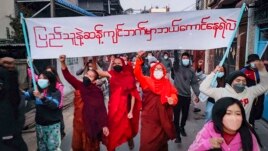01 February 2022
A nationwide strike in Myanmar marked the one-year anniversary of the army's takeover of the government.
Protests and violence across the Southeast Asian nation have raised international concern over the struggle for power.
Images and video on social media showed that a "silent strike" was taking place Tuesday in Myanmar's largest city of Yangon and other towns. People stayed home and businesses shut their doors in a show of opposition to military rule.

Youth activists and Buddhist monks participate in an anti-military government protest rally while holding a banner that reads in Burmese, "Who dares to stay on the opposite side of the people's will," on Tuesday, Feb. 1, 2022, in Mandalay, Myanmar. The ne
Violence was also reported. Myanmar, formerly known as Burma, faces a rebellion that some United Nations experts are calling a civil war.
Local media said an explosion killed at least two people and injured many more. It happened at a pro-military demonstration in a town on the eastern border with Thailand. The cause of the explosion is not clear.
The military took over Myanmar's government on February 1, 2021. It ousted the elected government of Aung San Suu Kyi. Her League for Democracy party was about to begin a second term in office. The party had won a large victory in the election of November 2020.
Widespread nonviolent demonstrations followed the army's takeover. But armed resistance arose after protesters were faced with deadly force. About 1,500 civilians have been killed. But the military government has been unable to stop the opposition.
The U.N. human rights agency says at least 11,787 people were illegally detained in the past year, including 8,792 who continue to be held.
The anniversary has gained international attention, especially from the United States and Western nations critical of the military takeover. The U.S., Britain and Canada on Monday placed new sanctions on the military. The U.S. also joined other countries calling for an international halt to arms sales to Myanmar.
Pro-democracy demonstrations were held in several towns and cities before the start of the nationwide strike on Tuesday. At that time, security forces are less likely to be out on the streets. Protesters carried signs and shouted anti-military slogans in Yangon, Mandalay and Sagaing. State-operated media reported that many business owners, who had announced plans to close Tuesday, were arrested.
"We might be arrested and spend our life in jail if we're lucky. We might be tortured and killed if we're unlucky," said youth activist Nan Lin.
Opposition fighters also claimed to have carried out bombings Tuesday in 11 areas of Yangon. The bombings targeted a police station and homes of military officers, among other sites.
In Tachileik in eastern Myanmar, an explosion at a pro-government event killed two people and injured at least 37 others. No one has claimed responsibility for the attack.
Early in the day, leaders of the opposing sides released speeches online to mark the anniversary of the army's takeover.
Duwa Lashi La is acting president of the opposition's National Unity Government (NUG). He said his group will carry on with the people's "revolution" against military rule. The NUG was created by elected lawmakers and considers itself the country's legitimate government.
General Min Aung Hlaing is leader of the military-ruled government. He promised in a speech to work toward a democratic system in Myanmar.
Myanmar's military said it took power because there was widespread cheating in the 2020 election. Independent election experts say they have seen no serious evidence for this claim.
Tom Andrews is the U.N. special diplomat on the situation in Myanmar. He said the international community must take steps to limit the military's access to weapons and money.
Andrews added that Myanmar's military had carried out "mass killings, attacks on hospitals and humanitarian targets, and the bombing and burning of villages."
I'm Caty Weaver.
Dan Novak adapted this for VOA Learning English based on reporting by The Associated Press and Reuters.
_______________________________________
Words in This Story
sanctions – n.(pl.) actions taken to force a country to obey international law by limiting or stopping trade or cutting economic aid
slogan — n. a word or phrase that is easy to remember and is used by a group or business to attract attention
legitimate — adj. permitted under rules or laws
escalation — n. becoming worse or making (something) worse or more severe